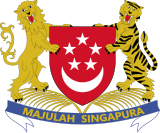
Back حقوق الإنسان في سنغافورة Arabic Droits de l'homme à Singapour French ადამიანის უფლებები სინგაპურში Georgian Prawa człowieka w Singapurze Polish Human rights in Singapore SIMPLE Singapurda inson huquqlari Uzbek 新加坡人权 Chinese
| This article is part of a series on |
 |
|---|
|
|
This article may be unbalanced toward certain viewpoints. (September 2024) |
Since Singapore's independence in 1965, the human rights of Singaporeans have been set out in the Constitution of Singapore and include rights found in subsequent amendments and referendums. These rights have evolved through Singapore's history as a part of the Straits Settlements, its years under Japanese occupation, its position as a separate self-governing crown colony, and its present day status as a sovereign island country and city-state.
Article 14 of the Constitution of Singapore, specifically Article 14(1), guarantees and protects Singaporeans' rights to freedom of speech and expression, peaceful assembly without arms, and association. As a parliamentary democracy, Singaporeans are also guaranteed democratic rights to change their government through free and fair elections.